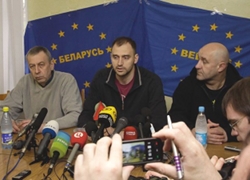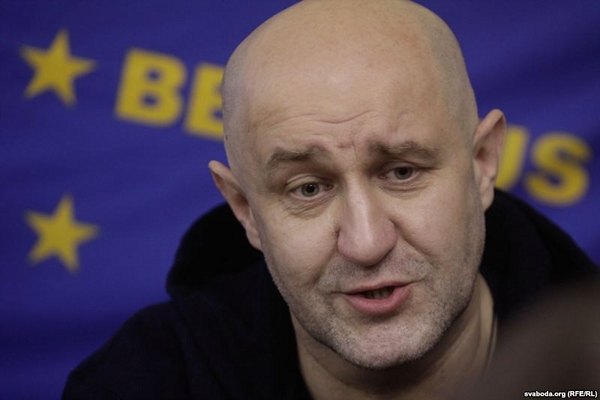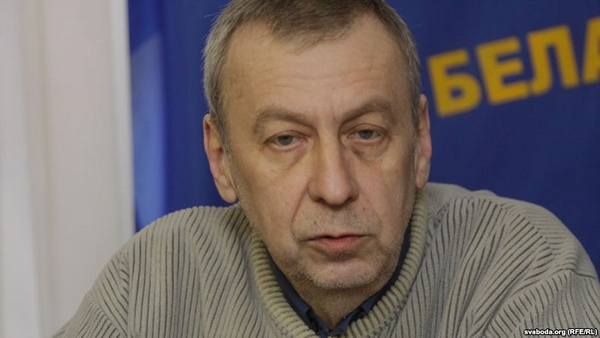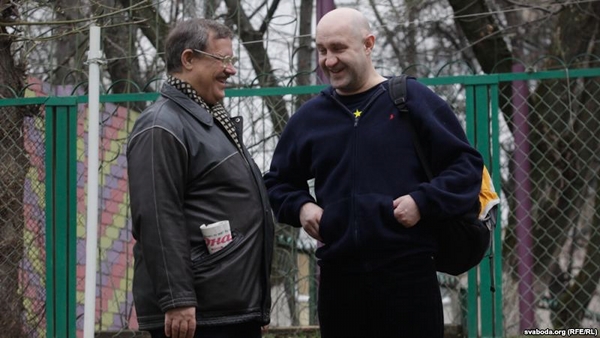Andrei Sannikov: It's terrible what they've done to my family
127- 17.04.2012, 13:54

Political prisoners Andrei Sannikov and Zmitser Bandarenka gave a press conference in Minsk.
Andrei Sannikov said at the beginning he had been summoned to a penal office in the morning, His criminal record will be removed in 8 years.
“I've just been at the Pershamaiski district police department that summoned me for registration. I was offered to sign a document saying I read and understood the procedures in relation to me – establishing surveillance in case of administrative offenses and so on. The criminal record will be removed in 8 years. I have not met such procedures before, but it shows the character of the clemency. I was assured that under law, I had no restrictions for travelling abroad, but they recommended me to visit the citizenship and migration office to clear out the issue,” the politician said.
The political prisoner added he had signed the clemency application to stop provocations and pressure. He stressed he had not admit his “guilt”:
“The document I signed is called an application for clemency. I did it consciously and I will not comment on this. I can only say I did not admit my guilt in spite of huge pressure to make me do this. I met pressure in the penal colony, but I cannot give details. I signed the application to stop pressure and provocations. I signed it because I understood at some point the issue was not about clemency.”
“Rather serious things would have happened to me, including physical elimination. Isolation began. I asked to allow me to make a phone call to my lawyer to say I had signed the application. But isolation did not stop, I was kept in a solitary cell. I was moved to a common cell in December, but then returned to a solitary cell. It was strong psychological pressure,” Sannikov said.
“I was in full isolation in Vitba penitentiary. It was dangerous to say hello to me. If someone greeted me, he was then called to the prison administration and threatened to be deprived of release on parole,” he said.
Answering a question about the forthcoming parliamentary elections, the presidential candidate said: “I do not think participation in the elections is possible under the current conditions. We have non-competitive elections. There will be no free elections in Belarus while Yarmoshyna heads the Central Election Commission. If we have an opportunity to give people information about the changes needed in the country, I think boycotting is logical. Organizing boycott requires much more activity than running in the elections.”
Sannikov said about his political activity:
“I think how to continue to live. It's terrible what have been done to my private life and the life of my family. I was in euphoria before, but it disappeared after today's visit to police. But I have to return to life. We will decide it with my wife and son.”
Sannikov said about other political prisoners: “All political prisoners should be released. We demand to free them. If the authorities do this, this step will be praised in Belarus and in the world.
I saw Kavalenka in prison. He looks awful. He should be released immediately. Everything can happen to other political prisoners. An urgent decision to release them on humanitarian grounds is needed.
Mikalai Autukhovich, Mikalai Statkevich, Dzmitser Dashkevich are in a difficult situation. Judging from my experience, anything can happen to them. If someone able to take this decision really hears me and really can make this decision, it should be done urgently.”
Sannikov was not ready to talk about the lessons he learned from the events on December 19, 2010. He says it was difficult to think about this in prison. “It was a moment of great enthusiasm and enlightenment that someone wanted to turn into a tragedy.”
“Those wanting to live in a normal country should learn a lesson from this,” the presidential candidate said.
Zmitser Bandarenka, the coordinator of European Belarus civil campaign, said about conditions in prison:
“My confinement conditions differed from Sannikov's ones. It was rather tough during the first two months in the KGB jail, but I knew Andrei faced worse conditions.
There were no laws. There were threats of raping and physical damage. But was happened to Andrei was an act of a drama,” the political prisoner said. “Sannikov was a presidential candidate, a successful presidential candidate. I knew in prison Sannikov had many votes at polling stations with normal vote counting. It was very hard in the first few months in the KGB jail, but I talked to some people who shared a cell with Sannikov and I knew Andrei was in far worse conditions. It was an act of a big drama. I don't know how I would have behaved if my wife had been in a neighbouring cell and masked people ruled in prison. There were no laws there. I heard threats to rape and injure me. A TV-set was turned off, but they then ordered to turn on TV and showed a report about an attempt to take Danik [Sannikov's son] from his grandmother. They said all over Belarus: this is your candidate, we can crucify him and do everything to his wife and son. It was an act of a big drama. There were attempts to press on me and recruit me. I said straightly there were lines that I would never cross and rather kill myself.
It was a conscious decision. I am a Catholic, but there were cases when soldiers of Catholic armies were allowed by Church to commit suicide if they were captured and could give evidence against their friends. I had this decision. I reminded about it several times and it created a kind of a corridor for me.”
Bandarenka noted a great number of people allegedly convicted for economic crimes are in prisons.
“It was an instruction not to talk to me. We are 'political prisoners', we have power, we have people who struggle for us. That's what I was telling to 'economic prisoners'. If people struggled for them, they would have power, too. Release these people, the country is dying without them. If you cannot free 'political', save 'economic prisoners'. Thousands and thousands of people go to work abroad today, while the people who could be useful for the country are in inhumane conditions in prison for nothing. It's very dangerous to be a Belarusian today. If you are a Belarusian, your chances to be thrown behind bars 2 or 3 times higher than in Russia and Ukraine and ten times higher than in Europe. It's as dangerous to be an official as in 1937. Belarus has a network of prisons and concentration camps. It's barbarity in the 21st century. Thousands of frozen hungry people. Twelve people died during the time I spent in the medical unit. The prison system of Belarus has ground tens of thousands of people for 10 years.”
After the press conference, Andrei Sannikov again thanked all people for their solidarity and support: “It was very important to feel support. I'd like to say special thanks to prisoners of Vitba penal colony, who supported me risking to lose a chance to be released on parole. I felt serious support from imprisoned officers of KGB and the Ministry of Internal Affairs.
Zmitser Bandarenka expressed thanks to the Belarusian Association of Journalists, its head Zhanna Litvina and journalists.













